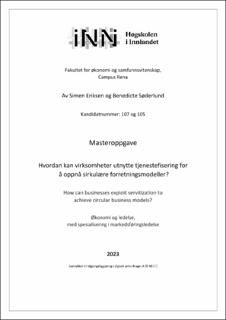| dc.contributor.advisor | | |
| dc.contributor.author | Eriksen, Simen | |
| dc.contributor.author | Søderlund, Benedicte | |
| dc.date.accessioned | 2023-10-25T16:10:22Z | |
| dc.date.available | 2023-10-25T16:10:22Z | |
| dc.date.issued | 2023 | |
| dc.identifier | no.inn:inspera:144976679:145660868 | |
| dc.identifier.uri | https://hdl.handle.net/11250/3098740 | |
| dc.description.abstract | Dette forskningsprosjektet vil omhandle tjenestefisering og sirkulære forretningsmodeller. Minimering av klimaskadene blir debattert verden over. Disse debattene baserer seg på stadig ny forskning som bekrefter et behov for endringer for å få ned utslipp, redusere avfall og øke utnyttelsen av ressursene, senest med FNs klimarapport fra mars 2023. For å løse disse problemene står verdenssamfunnet overfor et skifte hvor man må endre tankegang fra et lineært syn til et bærekraftig og sirkulært.
I vårt teoretiske rammeverk vil vi ta for oss sirkulær økonomi ved å fokusere på de fire parameterne vi bruker for å operasjonalisere begrepet: lukke, bremse, slanke og regenerere. Videre vil vi ta for oss temaene tjenestefisering, offentlige reguleringer, forretningsmodeller og digitalisering. Vi vil bruke Vargo & Luschs rammeverk, service-dominante logikk, gjennomgående i prosjektet.
Forskningsprosjektet er en kvalitativ studie og hører til konstruktivismen. Oppgaven er av et fenomenologisk forskningsdesign. Vi har gjennomført dybdeintervjuer med virksomheter i ulike bransjer og informantene er valgt ved et strategisk utvalg. Vi har gjennomgående vært opptatt av etiske vurderinger og å følge rådene til den nasjonale forskningsetiske komité for samfunnsvitenskap og humaniora (NESH).
Funnene i dette studiet indikerer at å bevege seg fra en lineær tankegang og over til en sirkulær, vil sette et viktig fokus på hele syklusen. Vi kan også se en positiv holdning til å tjene penger på reparasjon, ombruk, gjenbruk, leie, leasing eller andre ‘add-on’ tjenester. Informantene forteller også at synet på å eie er i endring, flere ser til delingsløsninger og leie som et legitimt alternativ. Det er videre et stort fokus på kvalitet. Ved høy kvalitet vil holdbarheten og levetiden til produktet forlenges og behovet for å ta i bruk tjenester øker. Garanti og service kan da være med på å forlenge produktets levetid. Videre ser vi at det er viktig å sette ting i system og skape sømløshet, som vil kunne gi konkurransefordeler. En faktor vi fant som er med på å bremse den sirkulære utviklingen er offentlige reguleringer, blant annet brukthandelloven og moms på reparasjon.
Studiet er ikke begrenset til en spesifikk bransje. Dette vil derfor være relevant lesing for virksomheter som har et ønske om, eller blir påkrevd å bli mer sirkulære. Vi vil legge frem ulike tiltak virksomheter kan ta i bruk for å bevege seg mot en mer sirkulær forretningsmodell. | |
| dc.description.abstract | The key concepts of this research project are servitization and circular business models. How to minimize climate change damage is a worldwide discussion and there is continual new research that confirms the growing need to make changes to reduce emissions, waste and increase the utilization of resources. The most recently is the UN climate report from March 2023. To solve these challenges the society as a whole needs to change their way of thinking from a linear to a circular and sustainable mindset.
Our theoretical framework will address the circular economy, where we will focus on the four parameters, we use to operationalize the concept: close, slow, narrow and regenerate. We will also include servitization, public regulations, business models and digitalization. During the project we will use the framework of Vargo and Lusch’s service-dominant logic.
The research project is a qualitative study and belongs to constructivism. The study is of a phenomenological research design. We have conducted in-depth interviews from businesses in various industries, and the informants have been selected through strategic selection. Throughout the project, we have taken ethical considerations by following the advice of the National Research Ethics Committee for the Social Sciences and Humanities (NESH).
The findings that emerge in this study indicate the importance of moving from a linear to a circular mindset, with a focus on the whole cycle. The informants are positive to the concept of making money from repair, reuse, recycling, rental, leasing or other services that can offered as an add-on. We also notice that the view on owning is changing. More view sharing solutions and renting as a legit alternative. There is also a focus on quality. With better quality, the durability and lifespan of the product will also be extended and the need for services as an add-on will increase. Offering guarantees and services can also be measures to help extend the lifetime of the product. Furthermore, putting things into a system that work seamlessly will give competitive advantages. One factor we found that can come in the way for circular development is public regulations such as the “brukthandellova” and VAT on repairs.
The study is not limited to a specific industry. It will be relevant reading for businesses with a desire of change, or that is required a change due to regulations regarding circular economy. We will present various measures that businesses can adopt, to move towards a circular business model. | |
| dc.language | nob | |
| dc.publisher | Inland Norway University | |
| dc.title | Hvordan kan virksomheter utnytte tjenestefisering for å oppnå sirkulære forretningsmodeller? | |
| dc.type | Master thesis | |
